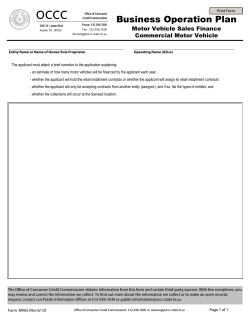
Modern Slavery Bill PART 3: Anti-Slavery Commissioner
Modern Slavery Bill Report Stage Briefing – House of Commons, November 2014 PART 3: Anti-Slavery Commissioner Introduction: The ATMG welcomes the proposal in Part 3 of the Modern Slavery Bill to introduce an Anti-Slavery Commissioner with a mandate to cover all forms of modern slavery. The role has the potential to spearhead the UK’s fight against modern slavery and ensure a world-leading response that mirrors good practice as demonstrated by the Netherlands and Finland. However, in order to achieve this, the Anti-Slavery Commissioner needs a wider remit than what is prescribed in the Bill and should be truly independent of the Government in performing its functions. Clause 21 of the ATMG’s Alternative Bill1 provides suggested, alternative language for this provision. The key elements of Clause 21, which are currently lacking in the Modern Slavery Bill, are that the Anti-Slavery Commissioner should: - Be independent from the government to freely decide activities, hire staff and control the office budget Oversee victim assistance measures including the statutory child protection response for child victims Have statutory powers to collect and request data and information on trafficking from a wide range of statutory and non-statutory bodies Monitor trends and assess the impact of policies and legislation relevant to trafficking Hold inquiries Report directly to Parliament Remit of an Anti-Slavery Commissioner Clause 37 in the Bill states that the Commissioner (a) ‘must encourage good practice in the prevention, detection, investigation and prosecution of [modern slavery] offences under Sections 1, 2 and 4’ and (b) ‘the identification of victims of those offences’. The government has made clear that they intend the role of the Commissioner to be limited ‘to driv[ing] improvements and a more coordinated law enforcement response to modern slavery’2, and that the role is ‘not designed to be akin to a national rapporteur’3. The ATMG believes that placing such restrictions on the role is shortsighted and will result in the role falling short in comparison to similar posts both the UK and elsewhere in Europe (see ‘Good Practice’ below). The Inter-Departmental Ministerial Group (IDMG) on Modern Slavery4 currently acts as the equivalent mechanism to a Rapporteur in the UK. However, the appropriateness of the IMDG to 1 ATMG, Modern Slavery, Human Trafficking and Human Exploitation Bill, 2014. http://www.antislavery.org/includes/documents/cm_docs/2014/a/atmg_modern_slavery_human_trafficking_ and_human_exploitation_bill_03_10.pdf 2 Page 3, Anti-Slavery Commissioner Candidate Pack, as advertised in August 2014. 3 Hansard, 11th September 2014, Column 331. Available: http://www.publications.parliament.uk/pa/cm201415/cmpublic/modernslavery/140911/am/140911s01.htm 4 Comprised of UK Government ministers and representatives from the Scottish and Welsh government and the Northern Irish Executive. independently scrutinise the Government’s performance and monitor policy implementation has been called into question5. Article 19 of the EU Trafficking Directive (2011/36) which provides for a National Rapporteur of Equivalent Mechanism states: ‘Member States shall take the necessary measures to establish national rapporteurs or equivalent mechanisms. The tasks of such mechanisms shall include the carrying out of assessments of trends in trafficking in human beings, the measuring of results of anti-trafficking actions, including the gathering of statistics in close cooperation with relevant civil society organisations active in this field, and reporting.’ The IDMG produces annual reports (which include UK statistics, and document UK legislative measures and Government activities) but performs no wider data-collection or monitoring function, and provides no independent analysis as to the UK’s effectiveness at tackling trafficking. As such, it could be argued that the UK is presently falling short of international standards6. The introduction of an Anti-Slavery Commissioner has the potential to rectify the shortcomings of these current arrangements. To do so, the Commissioner should, in addition to what is provided in the Bill, be mandated to: - Oversee victim assistance measures including the statutory child protection response for child victims Collect data from a wide range of statutory and non-statutory bodies7 Monitor the effectiveness of relevant law and policy Hold inquiries The government has argued that the role as currently mandated in the Bill "… is sufficiently wide to assist the commissioner in making a real difference both to catching criminals and supporting victims”8, and that it would be wrong for the provisions setting out the Commissioner’s role to be over-prescriptive, so that the Commissioner is dictated to. However, this somewhat misses the point. The remit is so narrow that the Commissioner will not be able to freely direct their focus to areas in future which will have the greatest impact. The Minister has noted the vital importance of improving prosecution and conviction rates, and has acknowledged that the key to it is in improving the support for victims, to enable more to come forward to take part in investigations and prosecutions9. The Commissioner has been pegged as being the driving force behind this increase. To then exclude victim assistance oversight, a key factor in achieving this, is therefore nonsensical. Another argument posited by the government for the limited mandate was that the role should not “duplicate that of other commissioners”10, such as the Victim’s Commissioner and the Children‘s Commissioner. However, the point of instituting an Anti-Slavery Commissioner would be to have someone who could view all relevant matters- identification, investigation, prosecution, supportfrom a modern slavery-focused perspective. Having this holistic viewpoint would ensure that the role has an overarching understanding of matters related to modern slavery. Of course, this does not prevent the Commissioner taking the decision, in discussion with other Commissioners, that specific work would best be done by others. 5 See for instance, House of Commons Library, Human trafficking: UK responses, Standard Note SN/HA/4324, 22 November 2013. 6 http://eur-lex.europa.eu/LexUriServ/LexUriServ.do?uri=OJ:L:2011:101:0001:0011:EN:PDF 7 Although the Commissioner has the power to request information from public authorities, in Clause 39, a more general data-collection function has not been envisaged. 8 Hansard, 11th September 2014, Modern Slavery Bill, HC Committee Stage, Column 327 9 Hansard, 14th October 2014, Modern Slavery Bill, HC Committee Stage, Column 445 10 Hansard, 11th September 2014, Modern Slavery Bill, HC Committee Stage, Column 328 The ATMG welcomes the inclusion of Clause 40(2) which permits the Commissioner to consider and draw conclusions on individual cases for the purpose of considering a general issue. This power should allow the Commissioner to investigate and hold inquiries in an individual’s case where the case raises issues of public policy relevance and has wider significance for other victims of modern slavery. Such power would be similar to the authority conferred on the Office of the Children’s Commissioner for England11, a power highlighted for its significance in the 2010 review of the office12. GOOD PRACTICE FINLAND’S NATIONAL RAPPORTEUR ON TRAFFICKING IN HUMAN BEINGS The Ombudsman for Minorities in Finland also acts as the National Rapporteur on Trafficking in Human Beings. Since its creation in 2009 the Office contributed to significant improvements in Finland’s efforts to combat trafficking in human beings. As a result of the Rapporteur's recommendations, a separate act on the system of assistance for victims of human trafficking has been developed, and human trafficking legislation has been reviewed and amended to ensure compliance with international legal obligations. Further improvements include the creation of an expert network of police specialising in investigations into human trafficking and related offences. In evidence for the Modern Slavery Bill inquiry, the Office of the Rapporteur highlighted the importance of their mandate, legislated for in the 2001 Act on the Ombudsman for Minorities and the National Discrimination Tribunal, in achieving these changes. The key aspects of the Rapporteur’s mandate include: • • • • Independence and autonomy (to ensure comprehensive evaluation of the implementation of anti-human trafficking measures, to independently decide upon their activities and issues of focus, and ensure the Rapporteur’s credibility in the eyes of NGOs); Access to all relevant information, including classified information; A direct link with parliament (in order to provide Parliament with up-to-date information to enable them to effectively steer the Government); A human rights approach to trafficking, in order to highlight the victims’ perspective. Independence of an Anti-Slavery Commissioner The success of the Commissioner will be dependent on its ability to thoroughly scrutinise anti-slavery actions in the UK and assess their impact. The ATMG believes that the current proposal is too limiting to enable the Commissioner to fulfil their task successfully. The current constrictions are that: 11 Children’s Act 2004, Part 1, Section 3, Subsection (1) and (2) Department for Education, Review of the Office of the Children’s Commissioner (England), 2010. https://www.gov.uk/government/publications/review-of-the-office-of-the-childrens-commissionerengland 12 • • • • The Commissioner is to be appointed by the Home Secretary13 The staff, resources and expenses required for the function of the Commissioner’s office are to be provided for by the Home Secretary14 The Commissioner’s activities and areas of focus have to be agreed upon by the Home Secretary15 The Home Secretary can edit and remove any material from the Commissioner’s reports and annual reports before publication.16 Rapporteurs in other European countries, such as the Dutch National Rapporteur have reiterated independence, including the perception of independence, and autonomy as crucial to their role17. Comparable bodies in the UK have echoed this view, including the Independent Reviewer of Terrorism and the Independent Chief Inspector of Borders and Immigration in their evidence to the Joint Committee on the Draft Modern Slavery Bill18. Merely inserting the word "independent", as the government is proposing through Amendment 35-38 and 13119, into the title of the Anti-slavery Commissioner will do nothing to further the body's independence in practice. Either the provisions for the Commissioner's remit, powers and practical arrangements will establish independence or they will not. As currently drafted, they fall very short of that. In a 2010 review of the Office of the Children’s Commissioner, several recommendations were made to increase and ensure the role’s independence. These included: independence to freely decide upon which inquiries and budget allocation; greater involvement of Parliament in the appointment process, and the ability to lay report directly before parliament without prior review and redaction by the Secretary of State. Further amendments were proposed20 to the role through the Children’s and Families Bill21 aiming to bring the role of the Children’s Commissioner for England further into line with the UN Paris Principles22 on the independence of national human rights institutions, stipulating that: “The Secretary of State shall not undermine the Children’s Commissioner’s independence and shall ensure that the Children’s Commissioner is under as few constraints as reasonably possible in determining: (a) the Commissioner’s activities, (b) the Commissioner’s timetables, and (c) the Commissioner’s priorities.” The ATMG recommends including a similar clause in the Modern Slavery Bill to ensure the AntiSlavery Commissioner can freely decide upon the office’s activities, without interference by the Secretary of State. 13 (Clause 36(1)) (Clause 36(3) and (4)) 15 (Clause 38(6)) 16 (Clause 38(10)) 17 See the 8th report of the Dutch National Rapporteur on Trafficking in Human Beings, 2010, p. 9 http://www.dutchrapporteur.nl/reports/eighth/, see the Report of the Joint Committee on the Modern Slavery Bill, page 78. 18 See pgs. 78-81. 19 House of Commons, Notice of Amendments, 30th October, 2014 http://www.publications.parliament.uk/pa/bills/cbill/2014-2015/0096/amend/modernslaveryaddednames.pdf 20 Briefing from the Alliance for Reform of the Children’s Commissioner, October 2013 http://www.crae.org.uk/media/65391/OCCE-Reforms-Children-and-Families-Bill-HL-Cttee-Briefing.pdf 21 http://services.parliament.uk/bills/2012-13/childrenandfamilies.html 22 http://www.ohchr.org/EN/ProfessionalInterest/Pages/StatusOfNationalInstitutions.aspx 14 At present, the post of the Anti-Slavery Commissioner will be solely funded by the Home Office. This contrasts with the Office of the Dutch National Rapporteur which is funded by a number of government departments; the Ministry of Security and Justice, the Ministry of the Interior, the Ministry of Foreign Affairs, the Ministry of Health Welfare and Sports, and the Ministry of Social Affairs and Employment. Having a range of funding sources is beneficial; it encourages buy-in and involvement from across government. The UK should consider moving away from having the Home Office as the sole funder to facilitate the integration and support for the post and to emphasize the separation between modern slavery and immigration. Questions to the Minister Will the Minister outline the reasons behind recruiting the post of ‘Designate’ Anti-Slavery Commissioner ahead of the completion of the Bill's passage through Parliament, given that the terms of the role may be altered significantly as a result of this scrutiny? Will the Minister confirm that Clause 40(2) of the Bill will allow the Anti-Slavery Commissioner to intervene as a third party in an individual’s case where the case raises issues of public policy relevance and has wider significance for other victims of Modern Slavery? Will the Minister clarify the reasons why the Anti-Slavery Commissioner does not have a specific function to scrutinise/strengthen protection for victims of trafficking and modern slavery? Will the Minister explain why, if the UK wishes to have world-leading legislation, the UK’s Commissioner role does not mirror the good practice as recommended to the Joint Committee on the Modern Slavery, such as that already developed and effective in the Netherlands? Can the Minister clarify how the Commissioner will effectively work across the UK and its devolved administrations, particularly where there is different legislation, policy and practice and ensure consistency in the UK’s approach to modern slavery? The Anti-Trafficking Monitoring Group monitors the UK’s compliance with, and implementation of, the 2005 Council of Europe Convention on Action against Trafficking in Human Beings, as well as the EU Directive 2011/36/EU on preventing and combating trafficking in human beings and protecting its victims. The ten organisations belonging to the ATMG are: AFRUCA (Africans Unite Against Child Abuse) Amnesty International UK Anti-Slavery International Bawso ECPAT UK Helen Bamber Foundation Kalayaan POPPY Project (of Eaves Housing for Women) TARA project (Trafficking Awareness Raising Alliance, of Community Safety Glasgow (CSG)) UNICEF UK http://www.antislavery.org/atmg For further information, please contact: Vicky Brotherton, ATMG Coordinator, at v.brotherton@antislavery.org +44 (0) 20 7737 9430
© Copyright 2025









